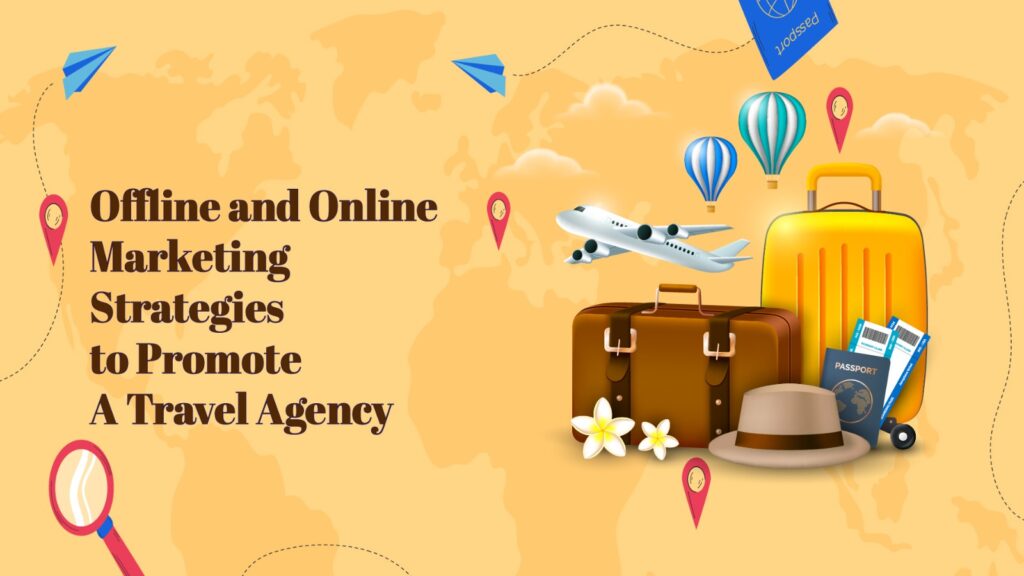In today’s fast-developing world, travel agencies face the challenge of becoming noticeable in a crowded marketplace. So it’s important to use a combination of offline and online marketing to reach the target audience and increase bookings. This blog will explore the key strategies travel agencies can use to increase visibility and attract customers with the help of both traditional and digital platforms.
In today’s changing marketing environment, travel agencies face the challenge of attracting tourists. While the internet has changed the way people search and book holidays, offline marketing strategies are still valuable. To stay in the competition, travel agencies need to strike a balance between offline and online marketing to make sure a good product is available over various platforms.
Travel agencies need to confirm that their marketing is effective, especially in a region like Surat where both domestic and international tourism is growing. This blog will look into the best online and offline marketing strategies that will help a travel business succeed and also strengthen relationships with customers.
Offline Marketing Strategies for Travel Agencies:
1. Print Advertising and Direct Mail Marketing
Print advertising is still useful for travel agencies in the digital age, especially for those who are targeting certain demographic groups. Newspapers, travel magazines, and newsletters can be great tools to reach people who still love to read. Beautiful images of beautiful places and well-designed packaging can motivate customers. Mail campaigns also provide personalized marketing. Sending flyers or promotions directly to customers can make a unique impression. Adding a limited time or discount can increase response rates and encourage people to ask more questions.
2. Event Marketing and Trade Shows
One of the most influential marketing tools is to attend or participate in tours, exhibitions, and trade shows. These events let travel agencies interact directly with potential customers and showcase their products and expertise. Partnering or joining a local travel agency lets your organization connect with visitors and travel enthusiasts. Personal consultations, guides, and on-site demonstrations help customers make informed decisions. The personal interaction of these events provides instant feedback to customers and creates relationships, which is an essential aspect of offline marketing.
3. Collaborations with Local Businesses
Partnering with local businesses can help tourism organizations increase their reach. Work with hotels, airlines, restaurants, and tourism boards to create travel packages that attract travellers. Offering special discounts or promotions with these businesses can generate more leads and conversions. Making relationships with local businesses, restaurants, and attractions can lead to great partnerships. Collaborate on partnerships, sell each other’s products across the industry, and attend industry events to expand your reach.
Online Marketing Strategies for Travel Agencies:
1. Social Media Marketing
With the increase of platforms like Instagram, Facebook, and Pinterest, social media has become the go-to tool for promoting travel. Visual communication is essential for travel agencies looking to attract customers. Post great photos and videos of your dream destinations, customer testimonials, and special offers to inspire your audience. Create a strong presence on social media platforms and share trip details, engage with your audience, and host contests or giveaways. Paid advertising on social media, including Meta ads, lets you target specific groups of people based on their travel preferences.
2. Search Engine Optimization (SEO) and Content Marketing
A travel agency’s website is their most valuable asset online. To increase visibility, focus on SEO and utilize the website for the travel-related content your customers are looking for. This can include specific details, travel information, and package descriptions. Content marketing also plays a major role in attracting customers. Regular blog posts about travel, destination tips, and insider tips can help your organization become a leader in the industry. By sharing this content you will drive traffic back to your website while providing valuable information to your target audience.
3. Influencer Marketing and Online Reviews
Partnering with a major travel influencer can elevate your organization’s online presence. Collaborate with a travel blogger, influencer, or YouTube creator to promote your travel experiences. Authentic content created by influencers can build trust and confidence among tourists. Likewise, good online reviews are important to the travel industry. Motivate your satisfied customers to leave reviews on Google, TripAdvisor, or your website. These reviews

